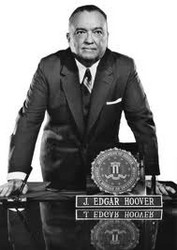J Edgar Hoover and Martin Luther King
|
| updated |
Copy Link Code
|
 It could be argued that J. Edgar Hoover had a particular dislike for the black community, and their leaders, in particular. From the early 20th century, Hoover showed disdain for the attempts of the black community to improve conditions for their members, in American society. One of these leaders was Marcus Garvey, a Jamaican leader who supported both Pan-African and Black Nationalism movements. As part of his black empowerment efforts, he established a shipping line – Black Star Line – to provide products from Africa and the Caribbean to the black community in the U.S. By 1919, Garvey had nearly two million followers, resulting in Hoover's intense fear that the leader's influence could change the face of American culture. Determined to stop such an event, in December 1919, Hoover hired the first black bureau agent – James Wormley Jones – to infiltrate Garvey's organization, provide intelligence to Hoover, and sabotage organization efforts. The shipping line eventually went bankrupt, and Garvey lost everything, leading to thoughts of self-harm.
It could be argued that J. Edgar Hoover had a particular dislike for the black community, and their leaders, in particular. From the early 20th century, Hoover showed disdain for the attempts of the black community to improve conditions for their members, in American society. One of these leaders was Marcus Garvey, a Jamaican leader who supported both Pan-African and Black Nationalism movements. As part of his black empowerment efforts, he established a shipping line – Black Star Line – to provide products from Africa and the Caribbean to the black community in the U.S. By 1919, Garvey had nearly two million followers, resulting in Hoover's intense fear that the leader's influence could change the face of American culture. Determined to stop such an event, in December 1919, Hoover hired the first black bureau agent – James Wormley Jones – to infiltrate Garvey's organization, provide intelligence to Hoover, and sabotage organization efforts. The shipping line eventually went bankrupt, and Garvey lost everything, leading to thoughts of self-harm.
However, the most notorious Hoover debacle in the black community was that of Martin Luther King, Jr. In the annals of history, J. Edgar Hoover and Martin Luther King, Jr. will be forever linked. As the first director of the FBI, J. Edgar Hoover was in charge of the nation's newly-established federal organization, including training and investigation. As one of the greatest civil rights leader in U.S. history, Martin Luther King, Jr. was renowned for his efforts to improve the treatment and living conditions of black Americans, throughout the 1950s and 60s. As Martin Luther King, Jr. was not a criminal, these two men should not have been linked in any way. However, true to his previous behavior – including his penchant for over-stepping his own power, for personal reasons – J. Edgar Hoover developed an unhealthy obsession with King. For reasons still unclear, Hoover decided to focus a nearly inconceivable amount of resources to the illegal, unnecessary, and unproductive surveillance of Martin Luther King, Jr.
For several years, Hoover devoted several FBI agents to the task of 24-hour monitoring of the activities of civil rights leader Martin Luther King, Jr. Obsessively determined to find evidence of some sort of crime or aberrant sexual activities, Hoover directed his agents to set up wiretaps, monitor travel, conduct surveillance, and record all of King's activities – including those he met with, what they discussed, how long they stayed, and how often they interacted – in an attempt to discredit or charge him with something. After years of fruitless efforts, Hoover submitted an illegally-obtained recording of conversations between King and others, purporting he had committed infidelity, and trying to convince the media to report it; they refused. Thoroughly frustrated, Hoover sent the recording to King's office, suggesting the leader either commit suicide or face exposure of his 'scandalous' behavior.
Despite years of surveillance, monitoring, and record-keeping, Hoover was completely unsuccessful in his attempts to discredit or criminalize Martin Luther King, Jr. Instead, the civil rights leader met a tragic end at the hands of an assassin, ending King's valiant attempts to secure equal rights for all citizens, regardless of their race. Never one to concede defeat, Hoover continued to insist King was somehow culpable, up until his own death in 1972.
